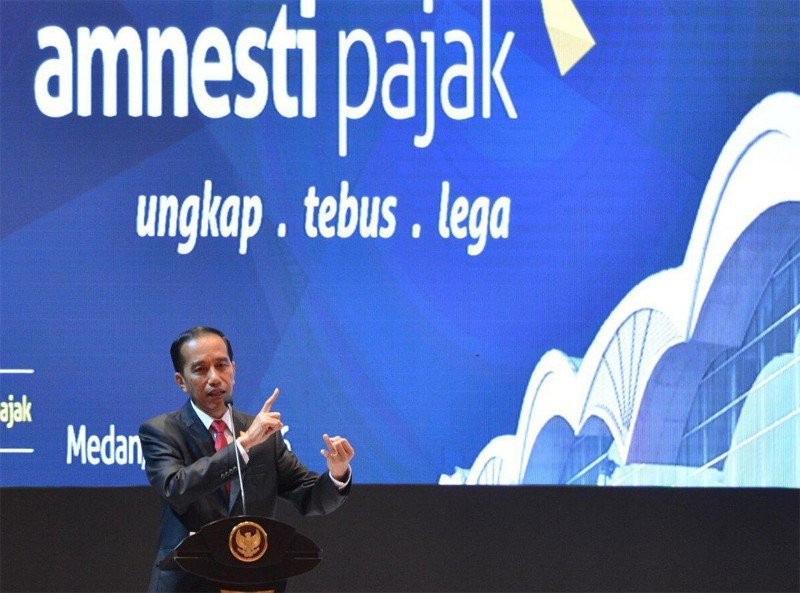COMMENTARY: President Jokowi’s tax amnesty policy a success story
Change Size
 President Joko "Jokowi" Widodo speaks during a campaign on tax amnesty program in Medan, North Sumatra on July 21. (Presidential Secretariat/Laily Rachev)
President Joko "Jokowi" Widodo speaks during a campaign on tax amnesty program in Medan, North Sumatra on July 21. (Presidential Secretariat/Laily Rachev)
T
he idea of a tax amnesty policy had been conceived in 2015 and was well-received and supported by President Joko “Jokowi” Widodo amid doubts and criticism from the public. The first phase of its implementation in the July-September 2016 period showed real success, which really heartened the President. What are the factors that made it a success and what is to be expected further from its implementation?
First, it was the acceptance and support of the President himself who was to face the fact that tax income as the main source of the state budget would not be adequate this year as a result of the slow global economic growth, thus special policies and measures were needed. The Finance Ministry was originally lukewarm to the idea, because two of its last efforts were not very successful due to the less encompassing tax amnesty policy introduced then.
However, this time the Indonesian Employers Association (Apindo), under the direction of Sofjan Wanandi, Hariyadi Sukamdani and Surjadi, strongly believed in the tax amnesty, fully supported the policy and campaigned vigorously for its success, together with the President himself. The House of Representatives was an early supporter of the tax amnesty, to their credit, and had the law passed within three months, keeping it confidential before its official implementation.
The international rule for transparency of taxation called the Automatic Exchange of Information (AEOI), supported by the G-20 in Hangzhou, accepted by over 100 countries and assisted by OECD in its implementation, made it possible that putting funds in places like Panama, the Cayman Islands, Delaware and Luxemburg no longer guaranteed secrecy, essentially making the funds transparent and usable. The tax amnesty can be its instrument.
For the first time, President Jokowi as well the leadership of Apindo felt that the tax amnesty effort had created a certain trust in each other, between the government and business. This should lead to a new era, a game-changer, for Indonesia’s future economic development. A certain optimism and trust has been built between the government and the private sector, which had never happened before.
This is important for further implementation of the tax amnesty and to make it a real success. That means there is a need to improve the tax authority, its laws as well as its numbers, as it has to create credibility and capability in the future. Additionally, the tax system should pay more attention to social justice.
For that to happen, the period of the next six months (phase two and phase three) should also pay more attention not only to the big companies but also to the SMEs that have not fully participated in this tax amnesty program. The problem of the “moral hazard” should also be paid attention to, especially in the next phase when the amnesty program ends.
In the meantime, the immediate results of the tax amnesty have managed to reduce the deficit of the state budget, strengthen the exchange rate of the rupiah and increase funds that go into the stock exchange. With this new optimism, more things can be done like using the newly gained capital to invest in infrastructure development, which gives greater support to the SMEs’ development. It should be possible to create higher growth, a possible 5.5-5.6 percent for 2017 on top of the 4.5 percent in 2016.
That is what President Jokowi called a new era of development — having more optimism, more attention paid to small companies and more trust and partnership between government and the private sector, a true period of national solidarity.
The first phase of the tax amnesty, which ended on Sept. 30, was a real success after a slow start on July 18. The amount of declared assets reached Rp 3.59 quadrillion (US$276.12 billion), almost 90 percent of the Rp 4 quadrillion target; redemption payments stood at Rp 88.5 trillion, more than half of the Rp 165 trillion target expected to cover this year’s state budget deficit.
A not so rosy outcome seemingly showed in the amount of repatriated assets, which hovered at only Rp 136 trillion, a far cry from the Rp 1 quadrillion targeted. But businesspeople recognized that it could be in fact Rp 500 trillion instead, because the rest has already been repatriated by businesses that have their capital moving in and out as a daily transition, and had repatriated before the start of phase one of the amnesty.
After all the experiences in the first phase of the tax amnesty, we should congratulate President Jokowi and his government, who believed in it and did their best in getting people, and especially businesses, to trust him in this program. Finance Minister Sri Mulyani Indrawati in particular with her steady and credible hand on the helm through the Finance Ministry had helped the implementation immensely.
Congratulations should also go to Sofjan, Hariyadi and Surjadi of Apindo, who positively responded to the program from the outset, and made it possible to be well-received by the private sector, a determining factor in the success of the program.
Hopefully the lessons learned from this national effort can serve as a model of trust and cooperation among the government, the private sector and the Indonesian people.
___________________________
The writer is vice chair of the board of the trustees CSIS Foundation, Jakarta.









